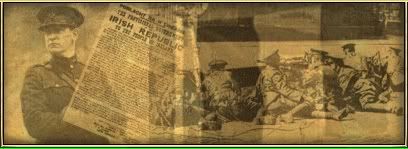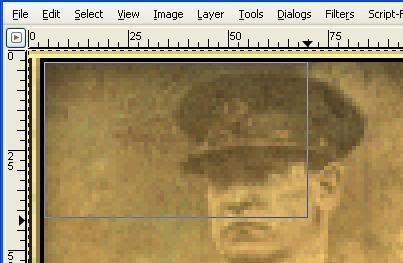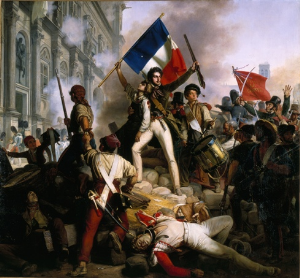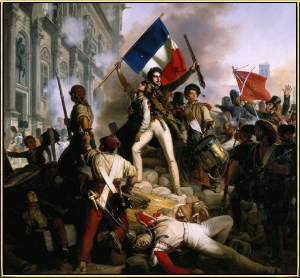[anchor=Dec2007-7]
The AARt of Writing - December 2007[/anchor]
by Phoenix Dace and Atlantic Friend
This is a transcript of a three-way chat between myself - Phoenix Dace,writer of
Services For One's Country, In Peace and War Alike, my co-host - Atlantic Friend, writer of
Crossfires, a French AAR for HoI2 Doomsday, and our guest - El Pip, writer of – among others -
The Butterfly Effect: A British AAR. Atlantic Friend and I decided it would be a good idea to have a four-way discussion each month on writing, and AARs, and put it in the AARLander. Unfortunately, we couldn't make it work with Lordling, who was to be our second guest this month, and so it ended up being a three-way discussion instead. Barring any further obstacles, Lordling should be a guest for the January discussion, since we asked him to take part in this one and a lot of why he could not was our fault.
Each month we hope to feature two different writers, and different topics of discussion, from previous months. This month we only introduced one of our planned topics, but as the discussion spread it ended up encompassing nearly all the others, so we actually did not have to broach our other remaining topics as topics themselves.
Note that the transcript has been edited for readability, but all actual content remains, except for brief discussion about technical errors that occurred a couple times. If you think that the three of us wouldn't actually talk on an instant message program with such perfect spelling and grammar, you just may be right.
Phoenix Dace: So, shall we get started?
El Pip: Let's go.
Atlantic Friend: As some form of introduction, I'd like to say the general idea of this little fireside chat is to broach a number of topics dear to every forum Author
PD: Yes, I suppose an introduction is in order. I'm Phoenix Dace, and I write the HOI2 AAR 'Services For One's Country, In Peace and War Alike'. My
fellow host today is Atlantic Friend, writer of 'Crossfires, a French AAR for HoI2 Doomsday', and our guest is El Pip, writer of too many AARs to count.
AF: It has struck Phoenix and I as a good idea to convene with a few other authors, both emerging or already widely acclaimed (yes, that's you, EP) to discuss the fine art of writing an AAR.
PD: If this works out, we're hoping to have this become a regular feature in the AARLander, where every month we have a discussion with two guests on various topics related to writing in general and AARs in particular.
EP: "Too many to count" Well I think it's three so I'm worried about the standard of the interview.....
PD: Just because we can't count doesn't mean we can't write.
AF: Do not worry, we are outrageous liars.
EP: True, numeracy is over-rated.
PD: 1, 2, many, lots.
EP: Woooo, lets not go that high. I'm not sure I've got that many fingers.
AF: The Detritus School of Accountancy, eh ?
PD: Nah, he could go all the way to many many many. We just get many.
PD: Also, I'm now seeing the word many as manly, and it's getting confusing. I think we should get started before we all go nuts.
AF: To make things simpler, I'll let Phoenix be the moderator and Great Asker of Questions.
PD: So, here's our first topic:
Since a story naturally involves a conflict, and every conflict must have more than one side, it is all too easy to make it seem as if one side (usually that of the narrator) is right and another is wrong. It is natural to give your characters biases, but how do you avoid a bias in the writing itself?
EP: Do you have to avoid bias?
PD: Excellent point.
EP: If you set the objective as unbiased that's different, but you can do a perfectly fine story with the most outrageous bias, slant and down right propaganda as long as you intend to do so and are aware of it
PD: I guess it depends on the viewpoint of the narrator of the story. If it's an omnipresent narrator, it seems wrong to give it a bias - such as if writing a third-person narrative. If writing a history book obviously written by someone from one side, or a first-person narrative, a bias could be seen as part of the story.
PD: For example, in my AAR it's from the point of view of the protagonist, Mark, and so I suppose everything that happens in it has a bias because of that.
AF: I'll be tonight's Great Dissenter, so I'd say yes, we need to avoid the bias - or that at least, the field of Alternate History requires a certain level of objectivity, if only to avoid weakening the plot. As you yourself pointed out in your canonization interview, EP, there is a great peril in making one's favoured faction semi-divine, and having everyone else being dupes or corrupt.
EP: Bias doesn't inherently mean wrong, assuming your aware of it the most likely problem is that you miss out on certain aspects of the story. But such omissions can be covered, by an chapter overtly biased the other way (character reading propaganda for instance).
EP: Or other similar type problems/solutions.
PD: That's true. You could have a bias one way for one part, and a bias another way for another part - for example, you could have different chapters focusing on different characters, so you hear both sides of the same issue, and from someone who truly believes it.
AF: So, you'd favour some subjective bias ? I would have to agree on this point. If the narrator in my story is a man with strong anti-military views, I concur this has to appear not only in the dialogue, but also in the way he sees and describes things.
EP: Precisely, one of my big points is consistency. Not only in plot but how the story is told.
AF: A sacred rule indeed.
PD: At the same time, I'd say you don't want an extreme bias. If you're writing, for instance, a history book, you don't want your writer to actually be demonizing the other side, unless you make it clear that that is what is happening. It would be all too easy to be writing that, even if that is what you intend, and have it come out that you're demonizing them in your writing.
PD: I'd say you want to be sure your readers know that the bias is not yours, but your character's.
AF: One of the advantages I see in putting a lid on author bias is to keep the readers on their toes regarding the plot. I started Crossfires with the idea that a mass right-wing party used the 1934 riots to take control in France, when in RL it brought the Socialists in power. If I portray the Socialists as weak dupes paid by Moscow, then I kinda narrow my choice of options when it comes to reaching a climax, or a turning point.
EP: Weak dupes are capable of incredible things under pressure or prompting. Just look at *Insert relevant political group here*.
EP: Seriously though if your keeping to plausibility and consistency it's hard to portray one group as weak dupes. Unless they are, in which case the first two points would limit your actions anyway.
PD: That's true, and I guess that it could either make readers think something good or something bad - either that the weak dupes aren't so weak after all, or that they've already set their mind against them, so they feel it's not really plausible/good.
PD: Referring to weak dupes doing amazing things, of course.
AF: Absolutely. If I portray all my characters as fairly as possible, without underestimating their different opinions, I can surprise the readers with either my favoured faction making a blunder, or their adversaries coming up with a great idea. I guess that comes to my deeply-ingrained prejudice - or let's say wariness - against heroes.
PD: Having a 'hero' is a dangerous thing. Maybe that should be our next discussion topic.
EP: Heroes have their place, but must not be overused or overhyped. I still maintain one of my favourite scenes to write was having HOI2 ARRland legend (TM) Otto Skorzeny outwitted by King Haakon.
EP: Just to bring him down a peg or seven
AF: What could be more satisfying than humbling the Hero / Villain ?
AF: Not to mention the surprise effect it has on readers.
PD: In my opinion, considering someone to be the 'hero' of a story, or an AAR, is inherently dangerous, because it makes you as a writer (or me, at least) start thinking they're more than they should be. If you start thinking of someone as a hero, they sort of take on an extra quality, that starts setting them above others, when they really shouldn't be.
PD: Heroes are very different from protagonists, and I think we see too much of the first and not enough of the second.
AF: I think too much heroics inevitably dissolve the plot into the ether by removing the element of challenge that is inherent to conflict, that key element of a story.
PD: Exactly. If you have a hero who can solve any conflict, what is the point of writing/reading? It would be like having every story be about James Bond.
AF: But a hero, or a set of main characters are necessary to lead us throughout the story.
PD: See, I wouldn't call the main characters heroes.
EP: Heroes are a lot less effort to write, which probably explains their prevalence. A flawed protagonist, with flaws that actually affect their performance and do lead to mistakes that matter, is much harder to write than the hero with a drink problem or who gets emotional after a mission when it doesn't matter.
PD: That's why I say that heroes are different from protagonists. A protagonist, or a group of main characters, has flaws. When you say 'hero', you imagine the square-jawed, shining smile, golden superman, and there's no way a protagonist should be like that.
AF: That's true. Would you say heroes are a lazy author's best friends ?
EP: Undoubtedly.
PD: Haha, that and spontaneous combustion.
AF: Never forget spontaneous combustion indeed.
EP: And critical mistakes only the hero can see.
PD: Ah yes, let's not forget the classic villain's plot, with a hole so big you could drive a herd of elephants through it, and only the hero notices.
PD: "I am going to keep a three-year-old on staff. If he can find any flaws in any one of my plans, I am going to scrap that plan."
AF: You mean the super-technical knowledge there's no way the reader can get, but which is daily displayed by the detective who knows that butterflies from the Bellarosa Superflenxis only mate from July the 5th to August the 14th ?
PD: That, again, I would say is a characteristic of the 'hero'.
EP: The other problem is, even if the plot is sound, the vilain will hire the "Imperial designer" from Star Wars. You know like one who put a hole down to the reactor in the Emperor's throne room. Muppet.
AF: Yeah, because "it sounded a good idea at the time".
PD: One knack a writer needs to develop is the ability to make a sound plan but still have the protagonist find a hole in it.
PD: Or, rather, make a hole in it.
EP: Or, if your really really brave, no hole and let the bad guys win.
AF: So, EP, you'd agree with Hitchcock when he said "the better the Villain, the better the movie" ?
EP: Yes, a story is only as good as it's villain. Unless you genuinely think the villain/enemy country/whatever can win there's no narrative to hold the interest. Just a series of updates until the 'hero' inevitably wins.
AF: SO true.
PD: Definitely a good point.
AF: The problem sometimes, in movies in particular, is that the author's
laziness kicks in, and a perfectly good and clever Villain suddenly makes things easy for the hero because the author is unable to think of a hole to put in the Death Star.
PD: Essentially, if a writer is lazy, the story can be great, but if eventually the protagonist wins by a deus ex machina of any sort, it's all wasted.
AF: And while it's easy to spot in and make fun of it in a movie, that is a peril that walks with us with every update of an AAR.
EP: No it's far worse for an AAR.
AF: Because we can always have a reader who'll sit up and think "wait a minute, why didn't Von Manstein counter-attack there, with all the forces he has at his disposal ?" or something similar.
PD: That's a good point - we don't get to comment straight to the writers in Hollywood.
AF: And because we're dealing with History, whose plots are usually thicker and more complex than a usual Hollywood movie
AF: Not to mention our readers are History Buffs par nature.
EP: Partly, but also because unless you finish the whole game before you start writing, and who honestly does that, you can find yourself painted in a corner not of your own making. The grand confrontation with Germany/USSR/The evil spy mastermind is a damp squib due to AI bugger up or whatever.
PD: True.
PD: That's why it's easiest to just not have a game behind it at all.
EP: But then it wouldn't be an AAR.
PD: Or to make it so abstracted from the game that you can't tell the difference. Referring to narratives, of course.
AF: Or to allow the story to override the game at some crucial points.
PD: I suppose it depends whether you're putting the story or the game first.
EP: Ohh it has to be the story, if you start putting the game first then your just setting yourself up for a fall.
PD: If you want to dutifully tell everything that happens, you might end up pigeonholed into a situation you'd rather not be in. If you'd rather tell a good story, it might not be accurate, but could work out better.
AF: The Paradox Games offer us the possibility to alter the game considerably, either through modding the initial scenario or via cheat codes. I agree the author should use it - but keeping in mind the mods have to be in favour of the story, not of the country he's playing, or else he's just putting bias into the game system as well.
EP: My only concern would be if your using the game as a "results generator" as I tend to (if only to avoid giving one side too many victories and to give me a rough base line on transit times. Ohh and to keep track of locations of units) then going too far from the game throws that out.
AF: I guess the story itself can be written in such a way to allow a little wriggle room. I had, through various circumstances, to re-start my Crossfires games three times, and the results of the Spanish Civil War were not completely similar in the three instances
AF: I chose to stick with what I had initially written, of course, but I was glad I had remained conveniently vague about some issues, such as the status of Euzkadi, which so far has been the major difference between the initial Crossfires story arc and the current one.
EP: That is why I only use the game for "Strategic" results not how they happened, it tells me operation/campaign 'X' was won or lost. Then I decide how that happened.
AF: I always find it useful to leave a certain possibility open - like, through speculation of a character who can be dead wrong about it, or be proven quite right later. this allows me to deal with some major unknowns in the story.
PD: If you tell everything, you end up with no room left for writing. You have to pick and choose what you say, what you leave wide open, and what holes from that you fill in yourself.
PD: And depending on those proportions, you get some very different stories.
EP: Well I tend to steer clear of characters so less of an issue for me. When I started I wasn't quite as confident so made a decision to stick with historic characters only, barring low level cameos of sub commanders, etc.
EP: If I was starting from scratch tomorrow I may well make a different decision, but I'm committed now.
AF: Plot holes, when they're not a mile wide, can indeed be a useful device - it gives you something to build on later. For instance, in my story the UK government's final stance on Germany and a possible Franco-German war is my biggest plot hole. I have tried to remain as vague as possible as to which way Her Majesty's government will go if, or rather when, the balloon goes up.
AF: That means a lot of unresolved issues now, but also an easier integration of the game results later.
EP: There's a difference between plot holes and just not mentioning something.
PD: Well, when you're writing about a Paradox game, there's no way you can predict the AI. I don't think anyone expects you to, either.
EP: Or alluding to it in vague ways. The plot is perfectly intact it's just the readers can't see it. Or they can see straws in the wind and small differences that, hopefully, in hindsight make sense.
PD: Of course, that doesn't mean you couldn't make it an issue. You could have analysts trying to figure out which way the Brits would go, pointing out pros and cons and so on, so that then you can explain away whichever way the AI does go, or whichever way you decide the Brits should go.
PD: That way you don't end up springing something on your readers at the last minute, or shoehorning the story into somewhere it really shouldn't be.
AF: Yes, you can hide something - especially if you're still yourself in the dark as to what will happen - but you have to throw some information to the readers, who at some point simply want to know the big picture.
PD: This is why I really like writing a spy story - I get to expose everything small piece by small piece, and the big picture unfolds very slowly.
AF: Exactly. That's how I proceed generally with potentially interesting but still developing situations.
EP: I do try and throw in misleading pieces. Partly as a cheap and seedy writers trick. But mostly because real life never throws up all the correct pieces in a near order, there will be conflicting information the protagonists will have to sort through.
AF: That's true. Chaos and mistakes and entropy do play a role. Nobody gets dealt the perfect hand - that could happen in real-life, but it's harder to justify in a book or an AAR.
PD: Well that, again, sort of comes back to the issue of what the protagonist knows - if he knows about the big hole in the plot, there's a problem with your villain. If he just knows everything, you've got a problem with your hero.
AF: And in both cases, your story has a potentially fatal illness.
EP: Unless he 'knows' everything but part of that everything is in fact wrong. Either deliberate misinformation or over-eager incorrect analysis.
PD: I'm more referring to ultimate knowledge, not 'what he knows at the time'. Solipsism can be a useful tool when writing.
AF: What would you say, Pip, has been your most daunting task writing your AARs, story-wise ?
EP: My complete inability to focus on the next update.
EP: I'm always thinking too far ahead about twists or turns in events that haven't even been put in motion yet.
EP: So actually writing the updates to get the words to the same place as my ideas can occasionally feel like a chore not a pleasure.
AF: I guess we all have this feeling from time to time.
AF: Itching to reach that splendid climax we've dreamed up, and instead getting stuck with preliminary moves
PD: I think we do to a certain extent. I often find I think of a great idea, but it doesn't fit in the story right now, so I have to wait about thirty updates before I can use it.
PD: So I end up sleepwalking through whatever I'm writing at that point so I can get ahead to this excellent idea.
PD: Except then, of course, I forget the idea and I'm left with a couple boring updates.
EP: I have a trick for that, I have a vast array of text files full of random ideas for the future.
AF: Ah, the Might-Have-Been's Might-Still-Bes ?
EP: Exactly. Everything from interesting characters to machines to intrigue to vague plot ideas gets jotted down.
PD: My problem is I often have ideas while away from my computer, and I forget them before I get home. I do have some text files, though not as many as would be as useful as I'd like.
AF: So, a little scoop here, where will the Butterfly Effect take us next ?
EP: Well reoccupying the Rhineland is still late. And the 2-26 incident in Japan is also overdue. Ohh and the Spanish Civil War hasn't kicked off yet.
EP: In all those cases the reasons and pressure behind the actions are still present, but the leaders haven't acted yet (for various reasons, not all voluntary). Those pressure still have to be released somehow, somewhere.
AF: What about Mark's adventures, Phoenix ? Where do you plan to take him next ?
PD: Well, obviously he's going to Turkey next. From there, I've got a bit of a surprise. All I'm going to say is it's a surprise to Mark as well as to the readers.
PD: And how about you? Obviously the France election is coming up, but what plans do you have after that?
AF: As long as it isn't one for the author ! Of all three of us, Phoenix, you must be the one who has to face the toughest issues in terms of characterization, as you chose to tell your tale in the 1st-person, with a character clearly identified as the story's hero.
AF: In one word : Münich !
EP: Covers a vast multitude of sins that word.
PD: Ah - protagonist, not hero.
...at this point the discussion rambled far off-topic for a short time and eventually settled on the topic of editing...
PD: And I'm going to edit out my mistake so no one else ever sees it
AF: Editing, yet another useful tool.
EP: Yet a vaguely depressing one.
PD: I've found an easy way to edit.
EP: As much as I know what I've written is rubbish I still don't like wiping it out to start again.
PD: If you write the updates ahead of time, then reread them before you post them, with fresh eyes, it's much much easier.
AF: I used it a lot in the beginning of my AAR, when I realized Paradox listed as living and breathing French ministers and generals who had been dead for quite a few years in 1936
AF: It made some of my updates smell like Voodoo sessions.
PD: Ha - Dawn of the Living French.
AF: Excellent title, I should have stuck with the stiffs and turn Crossfires into a comedy/horror AAR !
PD: Or just slowly change Luxembourg into a survival horror story.
EP: You mock the life giving powers of the Croix de Feu? Merely joining that party or thinking its a good idea can raise you from the dead.
PD: Dawn of the Living Grand Duchess.
AF: Do not tempt me !
PD: Hey, I wouldn't be complaining! At least then you'd update it...
AF: How do you deal, Phoenix, with the necessarily greater characterization of your main protagonist ?
EP: Less of your "Cyclopean interests".
AF: Hey, if Heaven can Wait, so can Luxembourg !
PD: Mark has developed, and continues to develop, in my head. By this point I'm basically just throwing situations at him and seeing how he would deal with them. And of course, he continues to develop, and change. I have plans for how he's going to turn out, they're just unfolding very slowly, because hey - it's only 1937, and if I finish the protagonist's characterization in 1939, what do I do for the rest of the war?
PD: Basically, I just fleshed out Mark as much as I could, and I continue to do so.
EP: It's a good plan, focusing on characters not events. Something I try for - How would the government/country actually react to something rather than what the 'Best' response is. A fully formed protagonist will always do something that surprises the author and leads him away from where he thought he was heading.
PD: One thing I always used to like to say about writing was that you should develop the characters and then let them react to the situations.
AF: Hajji Giray said something on one of the subforums about imagining the conversations your various characters would have if they were sitting at the same table.
AF: I thought it a little odd at first, but it certainly forces the author to focus on the protagonist' personality, and not its heroic function.
EP: You do need a cast of characters though. And fairly well rounded ones at that. Thats aid I can certainly see it's usefulness for an established story.
PD: One thing I remember him mentioning was to write just a whole bunch of dialogue and then assign it to characters after you've written it. In my opinion, I don't know if this would work with already-established characters, but if you wanted to introduce several characters at the same time, it could be a very useful tool to flesh them out for yourself.
AF: For further characterization, we also have models all around us. Our teachers or bosses can provide us with a variety of authority figures, and colleagues, friends, or just people we see can help flesh out a character.
PD: Well, they say to write what you know, so I guess to a certain extent most characters we write are based off someone we know, someone we met once, a stereotype, someone from a movie/book/TV show, someone media personality, etc.
AF: I certainly used characters from books I enjoyed. I guess there's a little of Discworld characters in both my AARs in this respect.
PD: Who
hasn't based characters off Discworld personalities?
AF: Sad people who don't have the books at their disposal, I guess.
EP: There are only a limited number of core characters. Almost endless variations of course, but still recognisably that same few core types.
AF: Yes, there are only a few archetypes in a story. Having archetypes is not a problem for an author - turning them into stereotypes is.
EP: Precisely. How your character performs there 'role' in the narrative is as
important, if not more so in some cases, than what that 'role' is.
PD: Excellent point.
AF: That's something we intend to discuss during another session, but do you think readers prefer to be surprised, or to be presented with reassuringly familiar story figures and plots ?
PD: Depends whether your readers enjoy Hollywood movies or not.
EP: Both.
PD: Also, let's not forget we're dealing with the same AARLand that will deify any story featuring Otto Skorzeny.
AF: Note to self : kill Skorzeny whenever possible.
EP: Even when he gets turned into the Six Million Lira Man there are still people who root for him.
PD: I've been tempted to introduce him to Services and then kill him off, just to screw with my readers.
EP: I've killed him, brought him back, killed him again and plan to bring him back again when I do my next "For the Fjords" update.
AF: To sum it up, EP, how do you think characterization of the protagonists can help or hinder a nascent AAR and beginning author ?
AF: Characterization or lack thereof, that is.
EP: Nice simple question there.
AF: I know, I know.
EP: Frankly characterisation is demanding and easy to get wrong. The route I've seen work well most often is to start simple, with a couple of broad traits (one 'good', one 'bad') and build up from there.
EP: I remember an article on sitcoms which is relevant. Assuming you have one main protagonist each of the other characters (or events) should play off and reveal different aspects of that main character. This approach forces you to add depth to a character only as needed and prevents a rush to fill out a character prematurely.
EP: Now that's a simplification and it's only one of many approaches BUT if your a beginning author it's simple and keeps you clear of most of the worst pitfalls.
PD: And on that note we should probably finish up. We've got an hour and a half of discussion, and the sooner we finish, the less I have to edit.
AF: Ah, that's an interesting take, because it's also usually said the Hero (in most tales and stories) should have one trait of each of the other Archetypes.
AF: Yep, great work !
PD: Thanks for joining us, EP! I think we made this a definitely worthy discussion.
EP: Well I do hope to be invited back next time to ramble at length about the topics we never got round to.
If you want to be included in a future session, send a PM to Atlantic Friend or Phoenix Dace. You will need to have an account on MSN Messenger which you are willing to expose to us (don't worry, we won't sell your email to spammers).















